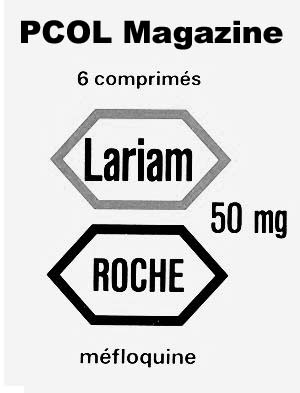
Newsweek reports on Lariam
Drugging the Troops
Many U.S. soldiers are being treated with a malaria drug that can cause psychotic episodes. Is this a good idea?
WEB EXCLUSIVE
By Martha Brant
Newsweek
Updated: 3:04 p.m. ET Jan. 09, 2004
Jan. 9 - My bad drug trip happened back in the mid-1990s. I was on call for the Department of Defense press-pool rotation. In the event of pressing military action, this pool of reporters would be activated and sent somewhere top secret. I never really expected to be mobilized, but I kept a bag packed and my pager at my bedside just in case. It went off one morning about 4:30.
advertisement
Bleary eyed and still believing this was just a test to make sure the pool actually gathered, I made my way to Andrews Air Force Base outside Washington. To my shock, we were really going somewhere but the Pentagon wouldn't say where. The military plane was on the tarmac and reporters were getting shots and taking a malaria pill called Lariam.
Lariam is the military's antimalaria drug of choice. In fact, it was developed for U.S. soldiers back in the 1970s. Lariam has been FDA approved since the late 1980s, so everyone from tourists to Peace Corps volunteers can now take it. There are several advantages to the drug over other treatments: it works in countries where mosquitoes are resistant to chloroquine treatment and you only have to take it once a week rather than daily.
The problem is Lariam—also known by its generic name, mefloquine—can cause serious neuropsychiatric side effects. It says so on the label. Let me tell you about mine. I had the weirdest dreams of my life on the stuff. It was almost as if I was hallucinating. I took just one pill during the weeklong DOD trip, which ended up being to the headwaters of the Amazon River in Iquitos, Peru, for drug interdiction. And I was supposed to take the drug for a month or so when I got back. That's when the nausea and dizziness started. I ended up deciding that malaria was better than feeling so sick and I stopped taking it. Soldiers, of course, have little choice but to follow orders and take the drugs they're given. Few know exactly what they're taking anyway. I asked one member of the Third Infantry Division recently what medication he took in Iraq and he said: "red pills." Unfortunately, soldiers are often on the front lines of drug research. That was the case with the controversial anthrax vaccine, which some soldiers have started to reject. Could Lariam be next?
According to the military, some 45,000 Lariam pills were prescribed to soldiers from October 2002 to September 2003. Even though Iraq is not a cholorquine resistant country (and it's desert, not jungle), many soldiers took Lariam during Operation Iraqi Freedom. That has some scientists and activists worried. "What the hell is the Army doing? We're giving this drug to people with guns!" says Susan Rose, whose group Lariam Action USA tracks bad Lariam experiences and aims to ban the drug's use.
E-MAIL NEWSWEEK
We're anxious to hear from U.S. troops stationed overseas and their families at home. E-mail us here.
Your name
Your town/city
Your e-mail address
Privacy
Most soldiers report no ill effects from the medication. But a few blame the drug for erratic behavior. Sgt. Georg-Andreas Pogany from Fort Carson, for example, believes Lariam triggered a panic attack in Iraq. He says that he was sleepless, vomiting and shaking and that he panicked after seeing a mangled body. As a result, he refused a direct order and was initially charged with cowardice. Now he faces dereliction of duty and his lawyer plans to argue that Lariam and combat stress were responsible.
After the war in Afghanistan, three other soldiers from Fort Bragg blamed Lariam for a far worse crime: they killed their wives. The Army looked into it and determined that Lariam was not clearly involved. They pointed to two other murders on base; the aggressors had not been deployed and were not taking Lariam. But the three who were on Lariam all committed suicide. Whether their action stemmed from guilt or some side effect from Lariam has been buried with them.
In fact, very little is known about how soldiers react to Lariam. "Under stress you have a greater probability of having neuropsychiatric events. Combine that with drugs ...," says Dr. John Guerigian, a former FDA medical officer. But he knows of no study of how Lariam affects soldiers who are under extreme stress. Roche Pharmaceuticals, which makes Lariam, has been gradually making its warning label more and more specific. The company now warns of "rare cases" of suicide on its label as well as incidents of aggression, psychosis and depression. That's not to mention confusion, anxiety, nausea, dizziness and other vestibular problems that have been reported—and not just by me. "The company has a duty to investigate the safety profile of Lariam especially when a very large population of our boys and girls over there are given this drug," Guerigian says.
But for now, the FDA has only required Roche to remind doctors to tell patients about these side effects. Soldiers will be lucky if they are even told what they are taking.
© 2004 Newsweek, Inc.
